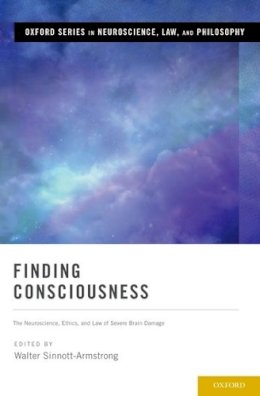
Stock image for illustration purposes only - book cover, edition or condition may vary.
Finding Consciousness: The Neuroscience, Ethics, and Law of Severe Brain Damage
Walter Sinnott-Armstrong (Ed.)
€ 129.44
FREE Delivery in Ireland
Description for Finding Consciousness: The Neuroscience, Ethics, and Law of Severe Brain Damage
Hardback. The prominent contributors provide background information, survey the issues and positions, and take controversial stands from a wide variety of perspectives, including neuroscience and neurology, law and policy, and philosophy and ethics. Editor(s): Sinnott-Armstrong, Walter. Series: Oxford Series in Neuroscience, Law, and Philosophy. Num Pages: 280 pages, illustrations. BIC Classification: HPQ; LNTM; MJN; PSAN. Category: (G) General (US: Trade). Dimension: 240 x 163 x 21. Weight in Grams: 554.
Modern medicine enables us to keep many people alive after they have suffered severe brain damage and show no reliable outward signs of consciousness. Many such patients are misdiagnosed as being in a permanent vegetative state when they are actually in a minimally conscious state. This mistake has far-reaching implications for treatment and prognosis. To alleviate this problem, neuroscientists have recently developed new brain-scanning methods for detecting consciousness in some of these patients and even for asking them questions, including "Do you want to stay alive?" These new technological abilities raise many questions about what exactly these methods reveal (Is it really consciousness?), how reliable they are (Do they fail to detect consciousness in some patients who are conscious?), what are these patients' lives like (Do they feel pain?), what we should do for and to these patients (Should we let them die?), who should decide (Are these patients competent to decide for themselves?), and which policies should governments and hospitals enact (Which kinds of treatment should be made available?). All of these questions and more are addressed in this collection of original papers. The prominent contributors provide background information, survey the issues and positions, and take controversial stands from a wide variety of perspectives, including neuroscience and neurology, law and policy, and philosophy and ethics. This collection should interest not only academics but anyone who might suffer brain damage, which includes us all.
Product Details
Publisher
Oxford University Press Inc
Format
Hardback
Publication date
2016
Series
Oxford Series in Neuroscience, Law, and Philosophy
Condition
New
Weight
553g
Number of Pages
280
Place of Publication
New York, United States
ISBN
9780190280307
SKU
V9780190280307
Shipping Time
Usually ships in 15 to 20 working days
Ref
99-4
About Walter Sinnott-Armstrong (Ed.)
Walter Sinnott-Armstrong is Stillman Professor of Practical Ethics at Duke University in the Philosophy Department, the Kenan Institute for Ethics, the Center for Cognitive Neuroscience, and the Law School. He has served as co-chair of the Board of Officers of the American Philosophical Association http://www.apaonline.org/ and co-director of the MacArthur Law and Neuroscience Project http://www.lawandneuroscienceproject.org/. He publishes widely in ethics, moral psychology and neuroscience, philosophy of law, epistemology, informal logic, and philosophy of religion.
Reviews for Finding Consciousness: The Neuroscience, Ethics, and Law of Severe Brain Damage
"You think people are either conscious or not? Think again. Walter Sinnott-Armstrong takes us by the hand through a forest of clinical exceptions and leaves us wondering what the very concept of consciousness really means. It is a brilliant analysis and collection of primary papers not to be missed because depending on the answer, we will decide whether or not to freely pull the plug on gramps."
Michael Gazzaniga, PhD, Director of the SAGE Center for the Study of Mind at the University of California, Santa Barbara
Michael Gazzaniga, PhD, Director of the SAGE Center for the Study of Mind at the University of California, Santa Barbara
